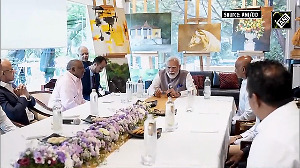The Japanese government has decided to substantially increase its Official Development Assistance to India after it lifted the economic strictures it imposed on New Delhi in the wake of the Pokhran nuclear tests in 1998.
Disclosing this in Bangalore on Thursday, Japanese Ambassador to India Akira Hayashi told rediff.com that the new ODA package was being finalised and would be announced by the Japanese government in January.
"Since Japan discontinued the economic measures imposed on India post-Pokhran tests last year, its ODA has been substantially increased as part of our commitment to the socio-economic development of India," Hayashi stated.
Though the Japanese envoy declined to give the amount of the fresh aid package being finalised, he hinted that it would be more than $630 million that was extended to India in 2000.
"As the largest donor to the ODA, the Japanese assistance will be extended this time to India's various infrastructure projects, including Delhi Metro, the Yamuna action plan and the power sector.
The Japanese government has also agreed to partner India in the ambitious project to clean the Ganga river with substantial financial assistance as part of the new aid package," Hayashi disclosed.
Over the years, the Japan's ODA to India has expanded to cover a wide range of areas from economic infrastructure such as electric power development to health sector, and from afforestation to the preservation of cultural heritage.
In the wake of Japan lifting sanctions on India on October 26, 2001, the Japanese government had set up a policy dialogue mission to formulate a new strategy for increasing its contribution to the ODA.
The mission has identified four priority areas:
-
Public health and medical care;
-
Agriculture and rural development;
-
Environmental conservation and protection; and
-
Improvement of economic infrastructure, for extending the assistance.
Besides Japan, the United Kingdom, the Netherlands, Sweden and Germany also contribute their mite to the ODA disbursements for India.
Hayashi, however, admitted that the Japanese contribution to the ODA had declined to $630 million in 2000 from a high of $865 million in 1999 due to the imposition of economic measures against India for the Pokhran nuclear tests.
"The cumulative amount of Japan's ODA to India over the last 40 years was up to $7.395.87 million (Rs 3,233.79 billion) at the end of 2000," the envoy claimed.
Earlier, addressing the 31st joint meeting of the India-Japan Business Cooperation, being held for the first time outside Delhi, Hayashi called upon the Indian government to accelerate its second generation of economic reforms for attracting more investments from Japanese global companies.
"First of all, India has to radically improve its basic infrastructure. Inadequacies in this sector are hampering the flow of Japanese investments into India.
The Indian government has also to check red-tapism and ensure that there are no frequent changes in its economic and tax policies so as to avoid sending wrong signals to global investors, especially the Japanese companies," Hayashi asserted.
Referring to the GDP target of achieving 8 per cent economic growth during the 10th Five-Year Plan (2002-07), the ambassador said the government had put a caveat that the proposed target could be achieved by taking a concerted action in several areas involving a radical departure from its present practices.
"India needs to implement measures encapsulated under the banner of 'the second generation reforms' if its economy is to realise its full potential. These measures are reforms in labor, power and tax, besides the ongoing privatisation efforts," Hayashi affirmed.
On Indo-Japan trade ties, the envoy lamented that the two-way trade figure between the two Asian countries in 2001 was less than what it was during the two previous years (2000 and 1999).
India's trade with Japan in 2001 was only 3.7 per cent or Rs 169 billion of its total world trade of Rs 4,513 billion.
Though investments from Japan to India stands next to the United States and the UK, their level and the number of Japanese firms in India are far from satisfactory.
According to a survey conducted by the Japanese economic journal, Toyo Keizi Sinpo, the number of Japanese companies in India is a mere 176 in 2002 as against a whopping 2,525 such firms in China.
Similarly, while the foreign direct investment flow from Japan into India was only $14.5 billion in 2001, it was a high of $144 billion into China.
"If India has to promote more FDI for accelerating its economic growth to 8 per cent of its gross domestic product annually, its government should implement the report of the steering group on FDI, prepared by Planning Commission member N K Singh," Hayashi declared.
In view of the advantages India commands in human resources, especially in the emerging knowledge-based industries, it should be able to attract more Japanese companies in the areas of information technology, biotechnology, and electronic products.
"India should also pitch in for more Japanese firms in the manufacturing sector in view of their global competitiveness. With high-skilled workforce and cost-effective production processes in place, India can also be an attractive destination for these firms," Hayashi affirmed.
The presence of major Japanese global firms such as Toyota, Honda, Mitsubishi, Kawasaki, and Yamaha in the automotive sector, and others in the chemical and electronic goods is a testimony to India's strength in the manufacturing sector.






 © 2025
© 2025